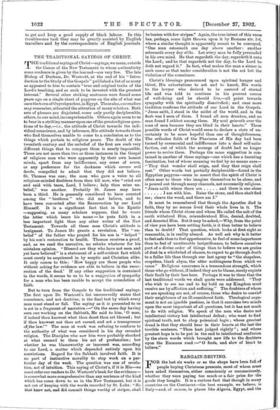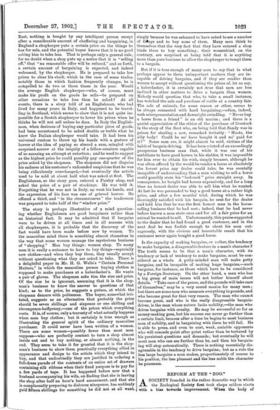BARGAIN-DRIVING.
FOR the last six weeks or so the shops have been fulltof people buying Christmas presents, most of whom must have asked themselves, either consciously or unconsciously, whether they were paying too much or a fair price for the goods they bought. It is a curious fact that though in many countries on the Continent—the best example, we believe, is Italy—and, of course, in places like Algeria, Egypt, and the
East, nothing is bought by any intelligent person except after a considerable amount of chaffering and bargaining, in England a shopkeeper puts a certain price on the things he has for sale, and the potential buyer knows that it is no good asking him to take less. That is perhaps only a general rule; for no doubt when a shop puts up a notice that it is "selling off," that "no reasonable offer will be refused," and so forth, a certain amount of bargaining is expected, and indeed welcomed, by the shopkeeper. He is prepared to take low prices to clear his stock, which in the case of some trades, notably those in which fashion frequently changes, he is compelled to do two or three times in the year. Would the average English shopkeeper—who, of course, must make his profit on the goods he sells—be prepared on other occasions to take less than he asked ? At all events, there is a story told of an Englishman, who bad lived for many years in Italy, and happened to be travel- ling in Scotland, which seems to show that it is not quite im- possible for a Scotch shopkeeper to lower his prices when he thinks he will not sell unless he does. In Italy the English- man, when desirous of buying any particular piece of goods, had been accustomed to be asked double or treble what he knew the Italian shopkeeper would take. It had been his universal custom to throw up his hands with a gesture of horror at the idea of paying so absurd a sum, mingled with surprised sorrow at the iniquity of a fellow-creature capable of so amazing an attempt at extortion; and he used to suggest as the highest price he could possibly pay one-quarter of the price asked by the shopman. The shopman did not disguise his sadness at his customer's unfounded suspicions that he was being ridiculously overcharged,—but eventually the article used to be sold at about half what was asked at first. The Englishman, so the story goes, entered a Paisley shop, and asked the price of a pair of stockings. He was told it. Forgetting that he was not in Italy, up went his hands, and the expression of his face was one of grieved horror. He offered a third, and "in the circumstances" the tradesman was prepared to take half of the "window price."
The story is perhaps illustrative of a mind question- ing whether Englishmen are good bargainers rather than an historical fact. It may be admitted that if bargains were to be driven at all times and in all seasons with all shopkeepers, it is probable that the discovery of the fact would have been made before now by women. To the masculine mind there is something almost shameless in the way that some women manage the mysterious business of "shopping." Men buy things : women shop. To many men it is really a nuisance to have to buy things—especially new clothes—and when they buy them, they usually accept without questioning what they are asked to take. There is a delightful paper in Mr. H. G. Wells's "Certain Personal Matters," in which the masculine person buying clothes is supposed to make purchases at a haberdasher's. He wants a pair of gloves. The shopman asks him the size and price. Of the size he is ignorant, assuming that it is the shop- man's business to know the answer to questions of that kind; as to the price, he suggests a guinea, at which the shopman demurs with politeness. The buyer, somewhat irri- tated, suggests as an alternative that probably the price should be seven shillings and sixpence or one shilling and elevenpence-halfpenny,—one of the prices which everything costs. It is, of course, only a travesty of what actually happens when men buy clothes; but it certainly is true enough as illustrating the general spirit of the ordinary masculine purchaser. It could never have been written of a woman. There are some women—possibly fewer than most men suppose—who are perfectly content to turn a shop almost inside out and to buy nothing, or almost nothing, in the end. They seem to take it for granted that it is the shop. man's business to show them practically everything allied in appearance and design to the article which they intend to buy, and that undoubtedly they are justified in ordering a full-dress parade of the contents of an entire set of drawers containing silk ribbons when their fixed purpose is to pay for a few yards of tape. It has happened before now that a husband accompanying his wife, on finding that she is leaving the shop after hPlf an hour's hard amusement, and that she
complacently preparing to disburse ninepence, has suddenly paid fifteen shillings for something he did not at all want, simply because he was ashamed to have asked to see a number of thIPngs and to buy none of them. Many men think to themselves that the very fact that they have entered a shop binds them to buy something; their womenkind, on the contrary, are surprised at being told that it is anything more than pure business to allow the shopkeeper to tempt them to a bargain.
But if it is true enough of many men to say that in what perhaps appear to them unimportant matters they are in- capable of driving bargains, and if they are readier than women to accept without questioning the prices of, let us say, a haberdasher, it is certainly not /true that men are less inclined in other matters to drive a bargain than women. Nobody would question that who, to take a small instance, has watched the sale and purchase of cattle at a country fair. The sale of animals, for some reason or other, seems to be always connected with hard bargaining,—often, indeed, with misrepresentation and downright swindling. "Never buY a horse from a friend" is an old maxim ; and there is a quaint appreciation of the ethics of the purchase of livestock in the story of the Scot who, on being told that Sandy was in prison for stealing a cow, remarked irritably: "Hoots, the silly body! Could he no' have bought it and no' paid for it?" Some men are, it might almost be said, victims of the habit of bargain-driving. It has been related of an exceedingly prosperous business man that, while it was one of his ambitions to have good horses in his stables, it was impossible for him ever to obtain his wish, simply because, although he was often offered by the would-be vendor a horse at absolutely the lowest price any dealer could take, he was mentally incapable of understanding that a man wishing to sell a horse could possibly state his " bed-rock " price straight away. In consequence, he bought bad horses expensively, and for a long time no honest dealer was able to Bell him what he wanted. At last he was persuaded to buy a good horse at a rather high price, and after a few months' trial, during which he was thoroughly satisfied with his bargain, he sent for the dealer and told him that he was the first honest man in the horse- selling business that he had met; indeed, that he had never before known a man state once and for all a fair price for an animal he wanted to sell. Unfortunately, this praise suggested to the dealer that he had found a good customer, and in the next deal he was foolish enough to cheat his man out- rageously, with the obvious and lamentable result that his customer never again bought a good horse.
Is the capacity of making bargains, or rather, the tendency to make bargains, a disagreeable feature in a man's character? The truth seems to be that a man's character, with its tendency or lack of tendency to make bargains, must be con- sidered as a whole. A petty-minded man will make petty bargains, and be incapable of making huge bargains,—such bargains, for instance, as those which have to be considered by a Foreign Secretary. On the other hand, a man who has a big grasp of main issues will not bother himself about details. "Take care of the pence, and the pounds will take care of themselves," may be a very sound maxim for many men ; but there are some men who measure everything in pounds, and who become great for that very reason. The man who cannot become great, and who is the really disagreeable bargain- driver, is the man whose nature lacks nobility,—the man who drives bargains with cruelty. He may be successful so far as money-making goes, but his success can never go further than a certain limit, because after a time he begins to meet business men of nobility, and in bargaining with them he will fail. He is able to press, and even to oust, weak, amiable opponents who will concede point after point rather than be tortured by his persistent questions and demands; but eventually he will meet men who can see further than he, and then his bargain- ing will stop automatically. There is nothing essentially dis- agreeable in the tendency to drive bargains; but as a rule the less large bargains a man makes, proportionately of course to his position, the less pleasant and the less noble the character he possesses.







































 Previous page
Previous page